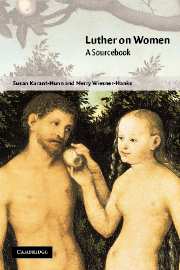8 - Katharina von Bora, Luther's wife
Published online by Cambridge University Press: 05 June 2012
Summary
While Martin Luther became something of a saint, such that images of him were “incombustible” and could occasionally work miracles, Luther's wife Käthe down through the centuries has borne the brunt of criticism until, in the second half of the twentieth century, her star began to rise, particularly among women. Beginning soon after their marriage, which took place on 13 June 1523, Luther referred to his Hausfrau in letters to a wide circle of friends, adding her greeting to his. Perhaps this was a technique for reconciling his inner circle to his wife. Initial reserve among Martin's colleagues turned to acceptance if not love.
The facts of their contented life together are well known. An equally significant result of Luther's lack of restraint, in comparison to any other Reformer, in describing his domestic life is that the Luthers as a couple quickly became a model of the Evangelical clerical marriage. Pointedly rejecting celibacy, Luther lived out the revolution within the parsonage that marked one of the Reformation's starkest departures from the Catholic ideal of priestly behavior.
Because of the ample record, including the observations written down by guests at the Luthers' dining table, we gain insight into Luther's dual concept of marriage as a source of satisfaction and, simultaneously, as a cross – a torment and burden. We are permitted to witness the pair's deep affection for one another and their children, Martin's happiness when Käthe was pregnant, their yearning to be together when one of them was traveling, Käthe's mastery as a brewer of beer – even, obliquely, their pleasure in sexual congress.
- Type
- Chapter
- Information
- Luther on WomenA Sourcebook, pp. 186 - 201Publisher: Cambridge University PressPrint publication year: 2003

